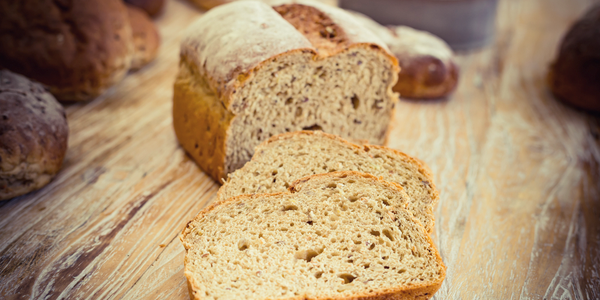
The recent obsession with Ezekiel bread has many people asking questions...
Is Ezekiel bread gluten-free? What is flourless bread or sprouted bread? Where can I find the best Ezekiel bread recipe?
And there is a reason people are crushing on this new crushed grain!
Read on to discover everything you need to know about Ezekiel bread, including the best recipes to try!
What Is Ezekiel Bread?
Ezekiel bread is considered one of the healthiest breads available. It is a type of sprouted bread, which means it went through the process of sprouting.
The bread is also referred to as Ezekial 4:9 bread, referring to the biblical verse describing several ingredients: "Wheat, and Barley, and beans, and lentils, and millet, and Spelt, and put them in one vessel, and make bread of it…"
Ezekiel bread contains healthy ingredients such as whole grains and legumes, and the sprouting process helps make more nutrients available compared to commercial bread varieties.
What Is Sprouting?
Sprouting is a process that grains undergo during certain growing conditions. Essentially, they burst from their outer shell in a warm and moist environment for a few days. This allows for the following:
• Reduced lectin content (lectin is a protein that can keep nutrients bound and is possibly linked with many health problems)
• Potential for easier digestion
• Potential for higher availability and nutrients levels
Basically, the process of sprouting allows for levels of healthy nutrients to be higher while reducing the number of antinutrients. Antinutrients do exactly what they sound like. They impede the availability of nutrients the body needs.
What Makes Ezekiel Bread Different?
Most commercial breads contain added sugars, refined wheat, or pulverized whole wheat. Each of these reduces the nutrient concentration of the bread.
Ezekiel bread is different:
• It contains no added sugar
• It is made from organic whole grains
• It undergoes significant nutrient changes during the sprouting process
The Ezekiel bread is like the average bread that became the best version of itself. Full of fiber, protein, and other nutrients, it provides more of what the body needs and balanced levels of less needed nutrients.
What is Ezekiel Bread Made Of?
Made up of sprouted beans and grains, Ezekiel bread contains a variety of plant-based components.
Ezekiel bread has four types of grains:
1. Wheat
2. Millet
3. Barley
4. Spelt
Two types of legumes are also included in Ezekiel bread:
1. Soybeans
2. Lentils
These components combine to give Ezekiel Bread its unique nutrient profile.
Is Ezekiel Bread Gluten-Free or Flourless?
Ezekiel bread is not suitable for those with gluten intolerance, celiac disease, or a soybean allergy. While healthier than its commercial counterparts, Ezekiel bread still has wheat, barley, and spelt, which all contain gluten.
While not gluten-free, sprouting the Ezekiel grains partially reduces the amount of starch and gluten content in the finished product. As a consequence, sprouted grains have a slightly lower level of carbohydrates than their conventional counterparts.
It is important to note that while gluten may be reduced in Ezekiel bread, wheat is still the main ingredient.
However, Ezekiel bread is not technically made with flour. It is composed of crushed grains and then mixed with other wet and dry ingredients like water, yeast, salt, and gluten. It is then baked into the bread.
Ezekiel Bread Nutrition
Especially when compared with white bread, Ezekiel bread contains a bounty of nutrients. It also provides fiber, which aids digestion and helps prevent disease in the body.
Commercial choices often included refined wheat and added sugar, both of which are significantly contributing to health concerns across the nation.
Elevated Nutrition
Since Ezekial bread has a higher bioavailability of vitamins and minerals, it can have an increased nutritional value.
Some of the increased components can include:
• Vitamin C
• Iron
• Vitamin E
• Beta-carotene (Vitamin A)
• Folate
• Fiber
• Magnesium
• Zinc
• Protein
Refined grains lose about 25 percent of their protein and have reduced levels of at least 17 key nutrients. Sprouted grains have been found in studies to be up to 300 percent more bioaccessible. This means that grains like Ezekiel bread can be easier for the body to absorb nutrients from.
Low-Calorie and Better for Blood Sugar
Sprouted bread has a lower glycemic index. That fact, combined with higher levels of fiber and protein make Ezekiel bread a great choice for those looking to better control blood sugar.
During sprouting, the grains also absorb water. This results in a lower-calorie sprouted bread at the end of the process. One slice of Ezekiel bread contains about 80 calories.
A Variety Available
Many variations on Ezekiel bread are available, such as:
• Cinnamon raisin
• Flax
• Low sodium
• Sesame
The varieties tend to contain the same original blend of grains and legumes as well.
Ezekiel Bread Recipes
Although Ezekiel bread is a staple sprouted grain on dietary patterns like the raw food diet, it can easily be incorporated into almost any diet. It is even egg, milk, honey, and animal product-free (on its own), making it suitable for vegan and vegetarian diets as well.
Make Your Own
Ezekiel bread does not just have to be bought at the store. The HSN Blog on nutrition, health, and sports contains an Ezekiel bread recipe with nearly 13,000 reviews and a favorable 5-star rating. Be sure to follow the instructions exactly, and note that there is an option to freeze the loaf for later.
From Breakfast Toasts to Lunchbox Sandwiches
Just like commercial breads, Ezekiel bread slices can be turned into toast. Top with chia seed jam, almond butter, and berries for a healthy and delicious combination. For a more savory combination, try tomato-stewed chickpeas and pesto on top of the toast.
A vegan BLT makes the perfect lunch and can be made even better with Ezekiel bread. A classic peanut butter and jelly can be sandwiched between two slices of Ezekiel bread as well.
Breadcrumbs and Beyond
Ezekiel bread can be used to make bread crumbs. This helps lower the calorie, sodium, and added sugar content of common dinner recipes, such as meatloaf. Upgrade nutrient uptake even further by baking low-sodium Ezekiel bread into veggie lentil meatloaf muffins.
Ezekiel bread crumbs can also be added to dishes like kale and Brussel sprout gratin with breadcrumbs and cashew cream. Between the bread, cashews, kale, and Brussel sprouts there are plenty of nutrients in this fiber and protein-packed dish.
Enjoy Popular Favorites
Swapping Ezekiel bread for commercial varieties can make popular favorites like french toast stand out. Make the breakfast classic even more of a hit by sweetening with natural sugars, such as honey or stevia. Flavors like cinnamon and vanilla also add a hint of sweetness without increasing the calorie count.
Take it up a notch by using healthy toppings, such as antioxidant-rich berries or another seasonal fresh fruit. Stuffed French toast with berry compote is an excellent twist on a traditional dish. Simply substitute the Ezekiel bread for whole wheat bread, then "bon appetit"!
The Bottom Line
Ezekiel bread is commonly found in supermarkets and health food stores. For people who are not gluten-intolerant, allergic to soy, or on a carb-restricted diet, Ezekiel bread is a healthier option.
Low in calories and high in nutrients, this crushed and sprouted grain is worth a try and the attention it is getting!
References:
Anderson J. Ezekiel 4:9 Bread Nutrition Facts. Verywellfit.com. Published January 30, 2020. www.verywellfit.com/ezekiel-bread-health-benefits-4587780.
D'Ambrosio A. What's Sprouted Grain Bread? Dieteticdirections.com.Published March 19, 2020. dieteticdirections.com/whats-sprouted-grain-bread/.
Gunnars K. Why Ezekiel Bread Is the Healthiest Bread You Can Eat. Healthline.com. Published May 22, 2018. www.healthline.com/nutrition/ezekiel-bread.
Lentz L. Whole Grains: Sprouted Grains. Todaysdietititan.com. Published June 2015. www.todaysdietitian.com/newarchives/060415p18.shtml.







